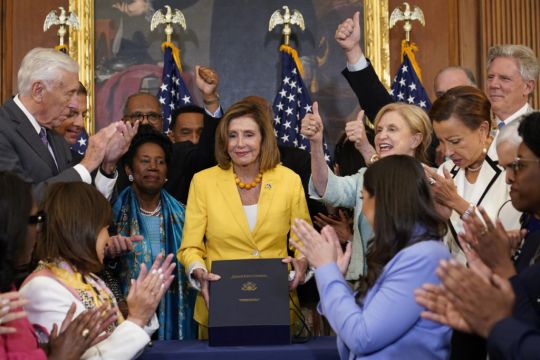A divided Congress gave final approval on Friday to Democrats’ flagship climate and health care bill, handing President Joe Biden a back-from-the-dead triumph on coveted priorities that the party hopes will bolster their prospects for keeping their House and Senate majorities in November’s elections.
The House used a party-line 220-207 vote to pass the legislation, prompting hugs among Democrats on the House floor and cheers by White House staff watching on television.
“Today, the American people won. Special interests lost,” tweeted Mr Biden, who was shown beaming in a White House photo as he watched the vote on TV from Kiawah Island, South Carolina. He said he would sign the legislation next week.

The measure is but a shadow of the larger, more ambitious plan to supercharge environment and social programmes that Mr Biden and his party unveiled early last year.
Even so, Democrats happily declared victory on top-tier goals like providing Congress’ largest ever investment in curbing carbon emissions, reining in pharmaceutical costs and taxing large companies, hoping to show they can wring accomplishments from a routinely gridlocked Washington that often disillusions voters.
“Today is a day of celebration, a day we take another giant step in our momentous agenda,” said House Speaker Nancy Pelosi, who minutes later announced the final vote as she presided over the chamber.
She said the measure “meets the moment, ensuring that our families thrive and that our planet survives.”

Republicans solidly opposed the legislation, calling it a cornucopia of wasteful liberal daydreams that would raise taxes and families’ living costs.
They did the same on Sunday but Senate Democrats banded together and used Vice President Kamala Harris’ tiebreaking vote to power the measure through that 50-50 chamber.
Mr Biden’s initial 10-year, 3.5 trillion dollar proposal also envisioned free prekindergarten, paid family and medical leave, expanded Medicare benefits and eased immigration restrictions.
That crashed after centrist Senator Joe Manchin said it was too costly, using the leverage every Democrat has in the evenly-divided Senate.
Still, the final legislation remained substantive.
Its pillar is about 375 billion dollars over 10 years to encourage industry and consumers to shift from carbon-emitting to cleaner forms of energy.
That includes four billion dollars to cope with the West’s catastrophic drought.

Spending, tax credits and loans would bolster technology like solar panels, consumer efforts to improve home energy efficiency, emission-reducing equipment for coal- and gas-powered power plants and air pollution controls for farms, ports and low-income communities.
Another 64 billion dollars would help 13 million people pay premiums over the next three years for privately bought health insurance.
Medicare would gain the power to negotiate its costs for pharmaceuticals, initially in 2026 for only 10 drugs.
Medicare beneficiaries’ out-of-pocket prescription costs would be limited to 2,000 dollars starting in 2025, and beginning next year would pay no more than 35 dollars monthly for insulin, the costly diabetes drug.







